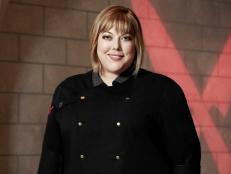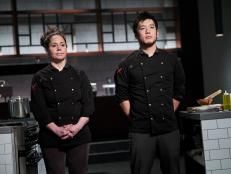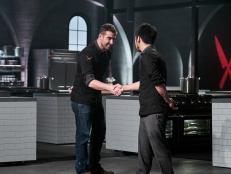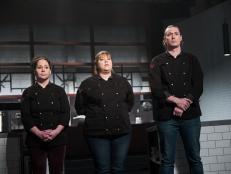The Journey to the Gauntlet: Chatting with Challenger Jonathon Sawyer from Iron Chef Gauntlet

Eddy Chen, Eddy Chen
This. Is. It. The fight to become an Iron Chef is unlike any other culinary competition, with the demands for precision, expertise, intuition and downright excellence the most rigorous in the business. On Iron Chef Gauntlet, seven of the country's most-elite chefs will come together to prove that their skills are the sharpest — but ultimately just one will earn the right to the run the gauntlet for the chance to join the ranks of the great Iron Chefs.
Before the competition begins on Sunday, April 16 at 9|8c, we're giving you, Iron Chef fans, the first introductions to the crop of challengers ready to do battle. Today we'd like you to meet Jonathon Sawyer, a chef from Cleveland. Read on below to get to know his style in the kitchen, and be sure to come back to FN Dish all week long as we present a new contender every day this week.
What's your style of cuisine, and do you have a signature dish?
Jonathon Sawyer: We have a range of restaurants in Cleveland, so it’s really more of a narrative that we follow, which is looking at traditional food, experiencing it, and interpreting it through our farmers and modern technique. It’s reverential to the past but also looking to the future. I think The Greenhouse’s signature dishes are whole roasted pig's head, Foie Gras Steamed Clams and our Crispy Chicken Wings Confit. Noodlecat is a ramen shop. Everything’s under $11, so our signature dishes really are probably pork miso ramen, college ramen, spicy octopus, udon and our crispy lake fish steam bun. Trentina’s fine-dining, Italian. Signature dishes [there] are beef jerky bucatini, the egg de Trentina, the huevo de Trentina, which is cooked in a spoon over charcoal, and our pane pizza with an edible candle, which is a candle in bread.
What's your proudest culinary achievement to date?
JS: Winning the Beard award was probably the most-satisfying accolade we’ve ever gotten. It’s not cheatable, it’s not a popularity contest. It’s how good of a cook you are. Food & Wine Best New Chef was phenomenal as well, and getting reviewed by The New York Times and Time Out a pretty long time ago — that was pretty big too.
What's your strongest skill in the kitchen, be it something technical or mental?
JS: I think my approach to food is probably my strength. The way we think about dishes and craft food isn’t very common. So I think it’s our approach and the presentation, and how we tackle a dish is very different and very unique to us.
Why do you have what it takes to be an Iron Chef? What makes you worthy of joining such esteemed ranks?
JS: I’ve been on Iron Chef more than anybody [here], being a sous chef and a challenger. I’d say I’m probably the biggest fan, since [the] Japan [series] through the first iteration [the series in] America, second iteration [in] America and The Next Iron Chef. I could probably list 100 different episode ingredients right now if I was pressed to. I think it’s through research and appreciation that I’m the most qualified.
What makes you unique in terms of your culinary expertise or your approach to food?
JS: I think it’s really [that] the way that we present food is deceptively simple. When you think about a dish that we’re known for — like I said, the confit wings or french fries, two of the most basic things you can ever imagine. But when you look at the recipes and the way that we take three and a half days through stark soaking to slow blanching to seasoning to pellicle to fry. Same with the chicken wings. Cured and then dried and then confited and then re-dried. The process that we apply to even the silliest things is much more intricate and really intended for the ingredient than I think anybody else.
Tell us about a day in your life. What are some of your primary responsibilities and roles?
JS: A day in my life is to wake up at 5, 5:30, get the kids off, cook them breakfast, make sure they have all the school activities ready to go. Maybe meditate, maybe do some yoga, maybe take the dogs for a walk. Go to Trentina first, because it’s closest to our house — Trentina is one of our restaurants. Check on the staff, have some face-to-face time, 15 minutes most per person, and then go to the office, which is in the middle of Cleveland. Spend some time in the office — recipes, ingredients, shows, press. Those are the duties that are happening there. Maybe prototype a dish, and then I’ll wrap it up by going to Noodlecat and Greenhouse before eventually heading home. My actual role with the group is inspire staff, recruit out-of-town and in-town talent, catalyze recipes and ingredients to get in the kitchens, and get press. That’s it. I’m not cooking your steak anymore, proverbially or literally or anything. I’m giving people the tools to cook it better than I do.
What do you think fans at home might not realize about what it takes to cook at such a high level?
JS: Constant failure. I think if you want to compete on Iron Chef, you have to fail probably thousands of times before that. You have to get used to nobody believing in you and not winning in order to win. Nobody has the shortcut or the quick path to famedom or celebrity chefdom or chefdom. You have to be able to get back up and learn from your mistakes and look your mistakes and your faults in the eye, and get better.
You mentioned your past appearances on Iron Chef America, and you’re a fan of Iron Chef and The Next Iron Chef. Do you think those experiences ultimately prepared you for this competition?
JS: Yeah, I think all of the fandom and participation prepared me to do this show, but I also know that there are some deficiencies in my game. The mechanics of getting everything in one trip, writing down your prep list, checking the clock — five minutes, timer’s all the time, double time — quadruple-prepping your proteins in case you have a failure. Those mechanics I definitely have an advantage on. My disadvantage is also my advantage when it comes to just being in a kitchen. I’m going to have too many ideas and not enough time to get them all on the plate, and that’s where I typically trip up — trying to add one more sauce, one more condiment, one more ingredient to the plate to show range.
If you had the chance to battle one Iron Chef, who would you choose and why?
JS: I’d love to challenge Geoffrey Zakarian, have a little rematch from our first battle against each other. I feel like him having Alex, who’s also an Iron Chef now, as a sous chef, that was a little close for comfort. And I like Geoffrey — we go back to New York days together — so I think it’d be nice to challenge him again.
You count them among your culinary mentors?
JS: Yeah. I would say so. I think MB it’s more advice and brothership. Symon is my culinary dad. He’s been there for all the bad, all the good, and he still helps me regularly.
What would be a Secret Ingredient that you'd dread finding on the altar, and why?
JS: I would say a dessert. If the Secret Ingredient was chocolate in a dessert sense or spun sugar — anything that I was forced to prepare a dessert for would be a failure. I’m not great at preparing a dessert. I can prepare a dessert or two, but a challenge that was just dessert based, that would be difficult.
Is there any dish or ingredient that you don't care for or will not eat?
JS: I don’t eat tuna. I haven’t eaten tuna in years for political and social reasons. If we’re not careful with our world's tuna population, we could see bigeye and bluefin tuna extinction in the next five years, and that’s not an exaggeration. I love tuna. I’ve been to Japan. I’ve seen the most-pristine versions of it, and I’ve seen cans of it. I took a stand a long time ago, and I’ve written about it before. I do not ingest tuna anymore, just because I want a couple other people in the world or the country to think about that Tuesday gas-station sushi roll. Do I really have to have a hand roll right now, or can I wait until I’m in a restaurant where it’s appropriate and where it makes sense to have this fish or the poke bowl or whatever it is? These big fish will be gone, and when they’re gone, who knows what’ll happen.
Beyond a knife and a tasting spoon, what’s one of your favorite kitchen tools?
JS: I am a knife guy — and I know you said beyond knives. I carry a switchblade at all times that is functional in the kitchen, and because I write with a pencil and [use it] to open packages. I honestly use it more often than any other tool in my life right now. A knife in your pocket that has the same grade of steel — molybdenum, B2, whatever you like — that’s big enough that you could turn an artichoke, cut a piece of salmon or open a box with it. I’m always looking for an upgrade and another one. I actually brought three to the competition. Depending on how long I’m in it, you may see all of my most-current obsessions of switchbladedom.
What's your favorite ingredient to work with these days? Anything new you're obsessing over right now?
JS: I tend to think seasonally, because I live in a part of the world that’s not thinking asparagus [in the winter]. We’re nothing thinking tomatoes, because we just lost it. I’m writing a vinegar book right now, so my brain is deep on citrus and vinegar and replacing citrus for vinegar. We just finished the dessert chapter and 14 recipes of desserts with vinegar. We made a key lime pie and replaced three quarters of the key lime juice and zest with vinegar. So that train of thought is very current for me right now — how and why haven’t I convinced Americans to more commonly use vinegar than to use citrus. Because it’s not easy to get Florida oranges to Maine, but it’s really easy to get Maine beer to turn into Maine beer vinegar.
You mentioned the vinegars. Do you think that’s one of the most-underrated ingredient these days?
JS: Yeah, I think vinegar’s totally underrated. When you talked to me 12 years ago, when I started making it in my Brooklyn apartment, definitely it was the most-underrated ingredient, and even seven years ago when we launched at the restaurants, it still was underrated. I think now America is realizing that vinegar does have a place everywhere in the kitchen, so we’re starting to see that iceberg rise.
Besides cooking, what do you like to do?
JS: When people ask me what I do, I say I’m a father first, husband second and chef third. So, my number one passion in the world is being with my kids and being with my wife and being a part of their activities, whether it’s cheerleading competitively or a soccer meet or just choir. That’s definitely the thing I’m most into. I haven’t had a car in years, so I’ve always been a bicycle rider, Vespa rider and motorcycle rider. So whenever I need freedom I’ll just put on a Kurt Vonnegut or Ayn Rand or a podcast and just disappear for three hours with the headphones in. We also go out in the woods a ton as a family, and as an individual with dogs, without the dogs, just foraging or identifying and not picking. [That] is a really common thing for us.
Any guilty food pleasures you’d like to reveal?
JS: Yeah, I have a Popsicle addiction. It’s really bad, especially in the summer. I have a throat thing, as you can hear. It’s a very weird voice-ish, but I lose my voice commonly, so I drink a lot of tea, I have a lot of cough drops. But then whenever there’s an excuse to put a Popsicle and help soothe the throat, I could eat a case of popsicles without even thinking of it.
Do you have a favorite flavor?
JS: I tend to go more sour, whole-fruit-flavored on the Popsicles. I don’t go with the double-fudge-stoner-caramel-dipped ice cream bomb, but I do have a Popsicle tattooed on my arm because of my problem. My wife used to have the other half on her arm.
What's the first dish you think an aspiring Iron Chef should master?
JS: I would say the best technique you can have is tasting your food and not being scared to taste it from raw to cooked. If you’re talking about a steak, steak comes at room temperature. Season it, taste it when it’s seasoned while it’s raw, taste it after it’s seared, when it’s seasoned. And [when] it’s resting, taste the juices that come out of it, after you slice it taste the end and the center and the middle. You need to taste your food before you serve it to your customers or guests bare-minimum three times. That’s the least I could ever imagine any cook working for me or any home person [doing]. And what you’ll end up realizing is that as you’re tasting and thinking and looking at the recipe, you’re actually training your brain to remember that taste in that part of the dish with that part of the recipe, and you use it as a memory tool to become a better cook or chef, because of the taste being something that’s registered. You don’t have to think about taste; you just taste. You don’t think about smell; you just smell. And the more often you do it in your process, the better you get.
Is there anything you want to say to introduce yourself to new audiences?
JS: I think being a Cleveland son I want everyone to come to the city and realize that the last generation got the city of Cleveland wrong, but this generation understands Cleveland, and I invite everybody to come and see what we’ve got to offer.
Tune in to the premiere of Iron Chef Gauntlet on Sunday, April 16 at 9|8c.
Related Reading:

































